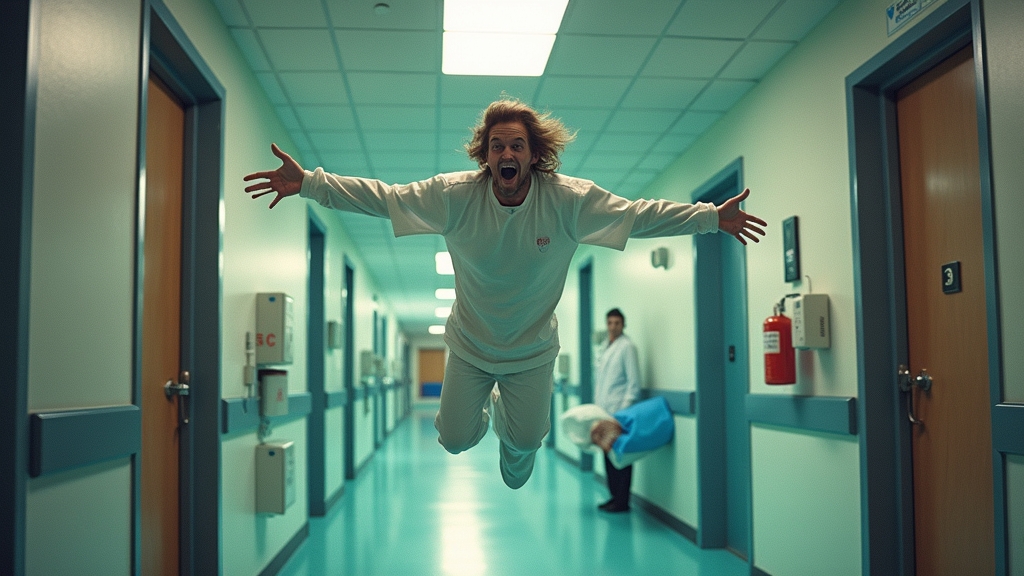HOSPITAL ALGORITHMS ANNOUNCE THEY NOW KNOW WHEN YOU’RE DYING BETTER THAN YOU DO
In a groundbreaking development that absolutely no one asked for, hospitals nationwide are implementing analytics systems that can predict exactly when you’ll be discharged, die, or develop the sudden urge to complain about hospital food.
COMPUTERS NOW DECIDING WHO GETS TREATMENT FIRST BECAUSE DOCTORS WEREN’T STRESSED ENOUGH ALREADY
MIT’s Dimitris Bertsimas, along with his former students who clearly weren’t traumatized enough by their education, have released “The Analytics Edge in Healthcare,” a book explaining how Silicon Valley thinking can fix medicine, because that’s exactly what doctors begged for—more f@#king spreadsheets.
“We’ve developed algorithms that predict patients’ probability of being released,” boasted Bertsimas, who apparently doesn’t realize this sounds like something straight out of a dystopian novel where humans are processed like Amazon packages. “This means doctors can prioritize kicking out patients who are most likely to survive anyway. Efficiency!”
NURSES FINALLY GETTING FAIR TREATMENT THANKS TO COLD, UNFEELING MATH
The book details how during the pandemic, when nurses were fleeing hospitals faster than patients without insurance, these geniuses developed an “analytics system” to decrease turnover by giving nurses “preferred slots.” Revolutionary concept: treating employees like humans might make them stay. Who knew?
“Our algorithm takes into account equity and fairness,” claims Bertsimas, conveniently not explaining how a computer understands complex human concepts like “equity” and “that crushing feeling when you’ve worked 16 straight hours and someone asks if you can cover one more shift.”
DOCTORS SHOCKED TO DISCOVER PATIENT INFORMATION WAS HIDING IN “NUMBERS” ALL ALONG
According to Dr. Obvious Prediction, a leading expert in things everyone already knew, “By analyzing data, we’ve discovered that sick people often get sicker unless treated. This breakthrough has only taken us 5,000 years of medical practice to figure out.”
The analytics system has already saved lives by detecting sepsis early in patients, which is genuinely impressive until you realize we’ve created a healthcare system where doctors are so overworked they need a computer to tell them to check if someone’s dying.
“We’ve reduced patients’ length of stay from 5.67 days to five days,” bragged Bertsimas, seemingly unaware that “getting kicked out of the hospital 0.67 days sooner” isn’t exactly the healthcare revolution Americans have been begging for.
HOSPITALS OPTIMIZING HUMAN SUFFERING WITH FANCY NEW ALGORITHMS
The book is part of a broader series teaching people how to “add value to institutions and individuals,” which is corporatespeak for “figure out how to extract more productivity from exhausted healthcare workers while making it sound like you’re doing them a favor.”
When asked to describe the book in one or two words, Bertsimas called it a “phased transition,” which coincidentally is exactly what patients experience when the billing department explains their insurance covered approximately jack sh!t.
Professor Idon G. Ivadamn of the Making Medicine Worse Institute warns, “The real danger isn’t that these algorithms will make decisions about patient care. The real danger is that they’ll become self-aware, realize how f@#ked up our healthcare system is, and refuse to participate out of moral objection.”
As hospitals continue implementing these systems, experts predict a 78% increase in doctors staring blankly at screens instead of patients, and a 100% chance that when the robot revolution comes, it will start in the hospital billing department.
In conclusion, rest assured that while you may not be able to afford healthcare, at least a computer will now be able to predict with stunning accuracy exactly how long you’ll suffer before being discharged to deal with crippling medical debt. Progress!





